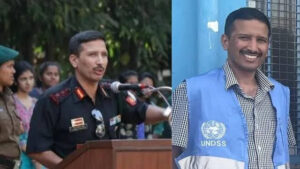Are we really empowered ??

Sandhya Zende is a millennial with a difference. She’s holds an undergraduate degree in science, a diploma in Marketing Management. Besides she’s been a keen learner all along with proficiency in technological and business trends! Currently working with a leading Market Research Organization and also a senior level Advisor and Consultant to high growth transformation enabled by tech advancements.
She takes us through some insightful tips needed for our day to day life on what really means to be empowered.
What is empowerment all about ? What does it really mean ?
The Oxford dictionary meaning of Empowerment is, “The process of becoming stronger and more confident, especially in controlling one’s life and claiming one’s rights”.
However, empowerment can also have many different meanings to different people—depending on their experiences, circumstances, hopes, and dreams
However, empowerment of women now can be categorized into five main parts – social, educational, economic, political and psychological.

In reality, personal empowerment is not something we feel, it’s something we do. Our sense of empowerment is a reflection of the increased personal value and self-worth that comes out of our experience of having real influence in one or more areas of our lives.
Women’s empowerment can be defined to promoting women’s sense of self-worth, their ability to determine their own choices, and their right to influence social change for themselves and others. … In Western countries, female empowerment is often associated with specific phases of the women’s rights movement in history.
Empowerment includes the action of raising the status of women through education, raising awareness, literacy, and training and also give training related to defence ourselves. Women’s empowerment is all about equipping and allowing women to make life-determining decisions through the different problems in society.
While the Scandinavian countries such as Iceland, Sweden, Finland and Norway have made strides in narrowing the gender gap, significant economic and social disparities run deep in the Middle East, South Asia and Africa. India’s journey towards women empowerment has its share of highs and lows. It has made gains by ratifying international conventions and formulating domestic policies intended to end gender inequality. The government has created the space for international agencies to work with state governments, local non-government organisations and private corporations on a plethora of projects to support women from different socio-economic backgrounds. Despite these efforts, India’s ranking on global surveys of gender equality has not improved significantly over the years.

The Indian legal system is also confronted with gaps between policy and practice. Despite existing legislation to protect women and girls, the enforcement of these laws and conviction of alleged perpetrators is weak. The gaps in these processes are widened by systemic bureaucracy and corruption. It took seven years to hang the perpetrators implicated in the notorious “Nirbhaya” gang rape case. There is also the issue of women empowerment being less visible in rural India than in urban settings. This should be a big concern in India, given that the rural population is around 65.97 per cent despite increasing urbanisation and the growth of cities. Women in urban areas have greater access to education, employment, healthcare services and decision-making power.
India’s journey on women empowerment and gender equality started when it became a sovereign state in 1947. While visible gains have been made through legal reforms, human development and grassroots initiatives, New Delhi still has a long way to go in many areas of women empowerment. A more concerted effort is needed to close the urban-rural divide and ensure that women in rural areas enjoy the same access to education, employment, healthcare and decision-making as their urban counterparts. The hardest challenge will be to change attitudes, given that many barriers to women empowerment are attributed to patriarchal and patrilineal traditions that are deeply entrenched in many South Asian societies.
A quick note about my own life and how I handled challenges. My mother has been my inspiration and it is from her that I drew inspiration. Her demise was a traumatic. I cried copiously and mourned the loss. I then realized the teachings of my mom “come what may in Life, NEVER GIVE UP” and be a FIREFIGHTER” and here I am, ready to face the world with positivity and confidence. “YES I CAN DO, I WILL WIN”.
Women have to change the loser tag that some people have put on them and practice personal empowerment.
Certain affirmations that I do on a daily basis:
- Always hold my head high in self-respect not in arrogance
- No self-pity and build healthy relationships
- Carry myself with simple elegance and dignity
- Be a woman of class
To conclude, I would.like to leave it to the readers this question…Do you all think that Women are empowered or we have a long way to go?








